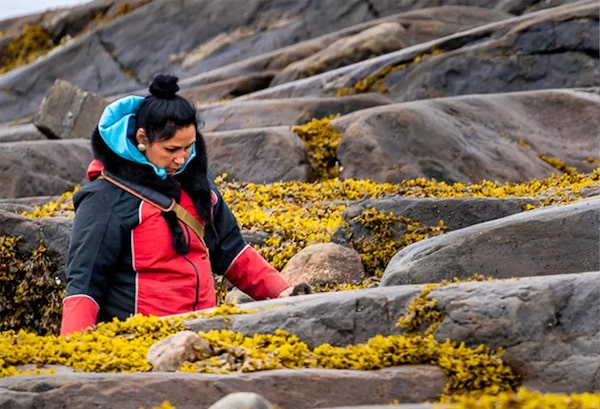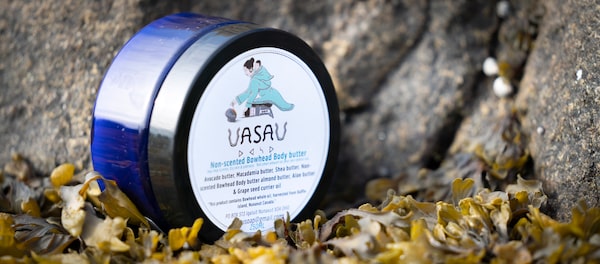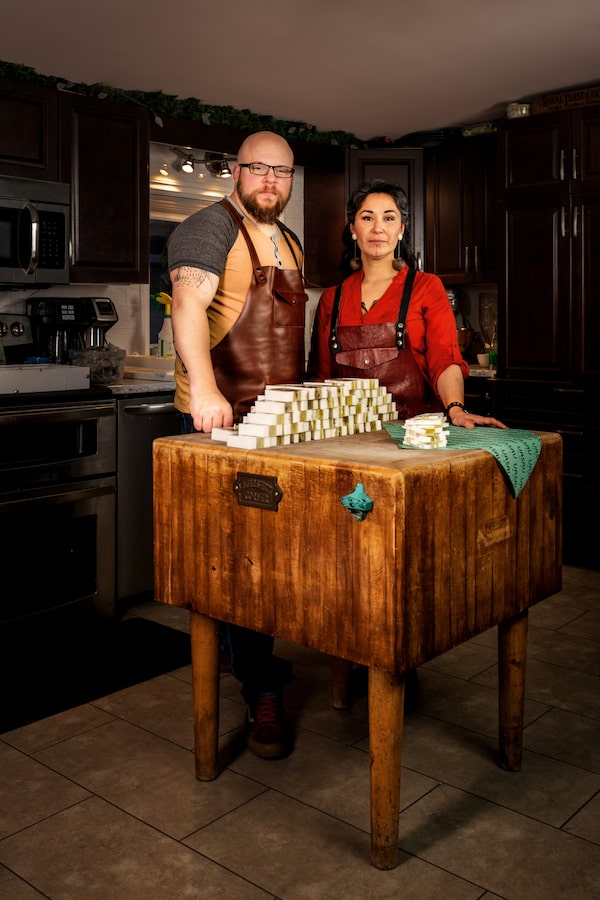
Bernice Clarke, founder of Uasau Soap, says using traditional ingredients, like bowhead whale oil, in her product line, has been 'healing for Inuit.'Chickweed Arts
Bernice Clarke first sought out a solution for her dry skin in 2012.
It’s a chronic problem living in the North’s “arctic desert,” she says. She was recommended body butter – which she purchased from a craft market in Ottawa. But with the high price of shipping to Iqaluit, Ms. Clarke sought a better solution: to buy the ingredients wholesale and create the butter herself.
Soon, Ms. Clarke, an Inuk woman from Iqaluit, was overflowing with the stuff and giving it away to her friends, who reported that her product was helping heal their dry skin and soothe their eczema.
With a bit of encouragement, Ms. Clarke decided to start selling her butter at a local craft fair. Her husband, Justin, was dubious that the product would sell – but Ms. Clarke returned home after two hours with over $3,000 and a sly, “I told you so,” she recalls.
10 years later, Ms. Clarke sells everything from body butters to handmade soaps under the brand Uasau Soap, now a household name in Nunavut as the only handmade soap company of its kind. Uasau became an incorporated company in 2016, the name a palindrome that plays on the English words “wash out” in Inuktitut. Today their products are found in a handful of stores across the North, as well as four craft galleries and retailers throughout the rest of Canada.

Uasau Soaps sell to patrons as far as Greenland and Alaska from the company's base in Iqaluit.Chickweed Arts
As an Inuit-owned company, Ms. Clarke and Uasau have won multiple awards, such as the Arctic lndigenous Investment Conference’s 2016 top Aboriginal business of the year, Start Up Canada’s 2019 entrepreneur choice award and third place at the 2021 Powwow Pitch. This past year, Ms. Clarke was nominated for the Canadian Small and Medium Enterprises’ Indigenous entrepreneur of the year, the winner of which will be announced in June.
For Ms. Clarke, Uasau has become a way to inspire and motivate other Inuit and Indigenous women to be successful. At the heart of their business, the Clarkes see Uasau as a product serving the North, returning traditional Inuit cultural practices and the healing properties of the bowhead whale to their community in a contemporary way.
In fact, the introduction of that special, locally sourced ingredient was a game changer for Uasau Soap. Around the time of their success at local markets, a friend suggested they add traditional bowhead whale oil to their soap, having heard about its healing properties, and gifted Ms. Clarke and her husband some blubber to start with.
The bowhead whale has long held a place of cultural and traditional significance with the Inuit, but colonial whale hunting threw a wrench in the tradition over the last century. As a result, prior to 2011, it had been off-limits for decades.
“Both of us thought she was crazy,” Ms. Clarke said. The pair looked at the smelly, aged blubber and proceeded to let it sit on the porch.
However, guilt got the best of Ms. Clarke for not using the gifted blubber. So, Mr. Clarke gave it a try. Initially fearing that the blubber would be too oily to emulsify into the soap, he researched traditional methods for extracting the oil, and tried what he calls the “hollandaise sauce” method, adding the oil to the soap mixture bit by bit until it would start to break apart. This proved successful.
“I did a little by little and we refined the oil the way they did it 100 years ago and it worked,” Mr. Clarke said.
Bowhead whale oil is now an essential ingredient in many of Uasau’s products, which are soothing for those who suffer from common skin ailments like seasonal dry skin, eczema and even psoriasis.
“It was healing for Inuit to hear that there was a bowhead oil in the product, which we lost 100 years ago due to the whalers,” Ms. Clarke said. “So [we’re] taking it back in a new and modern way.”

Husband-wife owner duo Justin, left, and Bernice Clarke have built a following for Uasau with the help of TikTok and some well-timed TV coverage.Chickweed Arts
The Clarkes have become participants in the resurgence of the traditional bowhead whale hunts for Inuit across the territory through a community lottery system, both within Iqaluit and in neighbouring communities.
All the communities and hunters and trappers associations are added to the lottery pool for the chance to hunt one of three whales. The whales must be hunted by the chosen group of communities within a certain timeline. A single bowhead can feed hundreds of people.
In the last nine years, Iqaluit has been successful at two whale hunts, one this past summer and one seven years ago. Before that, there hadn’t been a successful whale hunt in over 100 years.
“If Iqaluit does not get a whale and other communities do, Uasau will be a part of that,” Mr. Clarke said. “When it’s over, we’ll be able to come home with our blubber because Inuit leave nothing. That’s the way they were taught.”
Uasau’s connection to bowhead whale oil has become well known. Ms. Clarke has received messages and phone calls from the Inuit community as far away as Greenland and Alaska, where patrons and fans offer to send Uasau whale blubber.
“It was three or four times, somebody was saying, ‘don’t forget about Uasau Soap, they need blubber,’ and I cried when I heard about that,” Ms. Clarke said. “I got goosebumps.”
Through social media, Ms. Clarke has been able to build a community online. Her Tik Tok profile took off during COVID-19 and now boasts more than 100,000 followers.
“I find it’s quite spectacular that other Inuit will lift others up, they will actually showcase their friend, and they’ll tell their stories of what they’ve heard about another company,” Mr. Clarke said.
Now in what Mr. Clarke calls the company’s “teenage years,” Uasau has continued to grow steadily. Just before Christmas in 2019, Uasau launched its new website and, along with its Shopify advertising in Canada and the United States, was able to increase its sales by 30 per cent in 2020 and another 15 per cent in 2021. Mr. Clarke also attributes the spike in sales in 2020 to their appearance on an episode of the PBS show “Seeing Canada,” which aired in the United States.
“Because COVID happened, everybody was home. They were all watching TV, so we were getting 30, 40, 50, 60 sales a day online,” Mr. Clarke said.
The Clarkes reinvested every penny they made from Uasau back into the brand until they were each able to leave their full-time jobs – Mr. Clarke in 2020 and Ms. Clarke last November. As Uasau’s two only full-time employees, they’re hoping to receive funding to hire another employee.
Along with owning Uasau, Ms. Clarke also launched her own consulting company, Kuutuu Cultural Consulting, in the past three months, teaching Inukitut language and helping companies with cultural revitalization.
It’s a natural extension of the learnings from their own brand: Community, tradition and family are at the centre of Uasau Soap. The product is made, Mr. Clarke says, “for Inuit by Inuit,” and, Ms. Clarke interjects, “for the rest of the world to enjoy.”